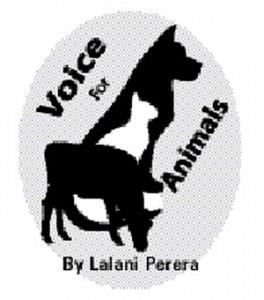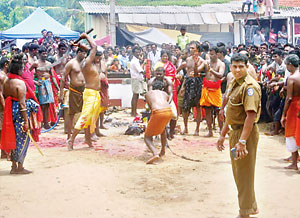The battle to stop animal sacrifice only one step away from total victory
View(s): Come August, a few years back, those with compassion for animals in their hearts had sleepless nights, thinking of the hundreds of goats and fowl that would be brutally sacrificed during the annual festival in Munneswaram’s Sri Bhadrakali Amman kovil.
Come August, a few years back, those with compassion for animals in their hearts had sleepless nights, thinking of the hundreds of goats and fowl that would be brutally sacrificed during the annual festival in Munneswaram’s Sri Bhadrakali Amman kovil.It all began with a photograph taken at the kovil on August 25, 2009.The photograph spoke a thousand words. A bare-bodied man was about to slaughter a goat, sword raised. Two other men were pulling the goat towards them, one by the animal’s head and the other by its hind legs, surrounded by bare bodied men and the severed heads of goats already slaughtered, with hundreds of spectators, including women and children, some on walls, some on roof tops watching the gory scene, with an obviously disturbed policeman looking the other way
That photograph created a public outcry with demands to stop this barbaric practice with wide media coverage condemning this primitive ritual
Then began our arduous campaign to save these hapless animals from this meaningless mass slaughter. Giving leadership to the campaign was a group of 14 – the Sri Bodhiraja Foundation, Jathika Sangha Sammelanaya, Dharmavijaya Foundation, Ven. Bandirippuwe Vinitha Thera, this writer, Irangani de Silva, Lorraine Bibile, Sharmini Ratnayake, Visakha Tillekeratne, Sagarica Rajakarunanayake, Dr. Chamith Nanayakkara, Somasiri Alakolange, Nikita Tissera and Gamini Wanigaratne.Within four years, with massive public support, the group achieved a major victory, though not a complete one.
In Buddhism and its Vedic Connections, Stephen Knapp relates how when Lord Buddha appeared, the people of India, following the Vedas, had deviated from the goal of Vedic philosophy and had become preoccupied with ceremonies and rituals, including animal sacrifice for material enjoyment. They indulged in eating flesh and misled by unworthy priests, unnecessary animal killing occurred with people becoming more degraded and atheistic.
Richard Gombrich and Gananath Obeyesekere in Buddhism Transformed – Religious Change in Sri Lanka describe Kali as a major Goddess in Hindu mythology, having both benign and terrible forms – the terrible form literally thirsting for blood. They opine that the Kali cult long widespread in South India, could hardly have remained unknown to our island.
During the festival one can see goats being dragged to the kovil not only by Hindus, but also those of other faiths, who spoke of their expectations of receiving divine favours for their children to pass exams, win court cases, punish enemies, secure employment, and in the case of childless women, to conceive, to mention a few.

According to Gombrich and Obeyesekere, a Cabinet decision of June 24 1979, had banned animal sacrifices in Hindu temples. Local villagers say that in the 1980’s there were no sacrifices, but by the late 1980’s, the practice had re-emerged, allegedly due to political influence. Former Supreme Court Judge Justice C. V. Wigneswaran, now Northern Province Chief Minister, spoke of court rulings in Jaffna in the 1970’s prohibiting animal sacrifice, including his rulings as District Judge during that time.
While the Jathika Sangha Sammelanaya, condemned the sacrifice, the All Ceylon Hindu Congress issued a statement that, “Such an act of sin can be committed only by those who do not know our religion. Our religion treats even animals as the children of His Almighty and not only killing of animals, but even any cruelty to animals cannot be tolerated in the precincts of a Hindu Temple”.
A peaceful protest led by the Jathika Sangha Sammelanaya, organised by the Sri Lanka Animal Protection Association (SLAPA) and the Animal Welfare Trust (AWT) was thwarted by the police who rushed to the Chilaw Magistrate’s Bungalow and obtained an order to stop the protest stating that it would cause a breach of the peace. Thus, in 2010, with the riot squad guarding the kovil, the sacrifice took place with full police protection. Ven. Bowatte Indararatana Thera, who immolated himself on Vesak Day 2013, opposite the Dalada Maligawa, opposing cattle slaughter lent much strength to the campaign.
Three group members visiting the kovil, the night before the sacrifice in 2010, witnessing hundreds of goats and fowl in overcrowded enclosures in the kovil premises, lodged a complaint, requesting the Chilaw police to prevent this unlawful sacrifice. The police reluctantly recorded the complaint only when realizing that there was a lawyer and a veterinarian among them, but failed to act. Determined to “do something” as promised to her daughter traumatised by that photograph, and undeterred by a colleague’s repeated warnings not to “anger the gods” the lawyer complainant filed a private plaint against the kovil priests in the Magistrate’s Court and sought a District Court injunction to prevent the sacrifice.
An Adhistana Pooja organized by SLAPA and AWT drew a massive crowd .
With the group, in 2011, appealing to then President Mahinda Rajapakse, there was a complete reversal by the police, who citing a possible public uproar obtained a court order,this time prohibiting the sacrifice.One also recalls how, then Minister Mervyn Silva stormed the kovil and rescued some animals and how a young member of the group saved a fowl dashed on a concrete block and carried it to safety amidst threats from devotees.
A public petition initiated by the Multi Religious Alliance for the Prevention of Cruelty to Animals appealing to then President Mahinda Rajapakse, to ban animal sacrifice, with over 750,000 signatures was handed over at Temple Trees to the present President Maithripala Sirisena, then a senior Cabinet Minister.
2013 was the turning point. The group filed a writ application in the Court of Appeal for an order to stop the sacrifice. The court determined that the sacrifice was unlawful as it violated the Butchers Ordinance since the kovil had no slaughter permits and the manner of slaughter was cruel thus amounting to an offence under the Prevention of Cruelty to Animals Ordinance. The argument for the kovil was that the sacrifice was a custom dating back to many centuries and any interference to stop it would infringe the fundamental right of freedom of religion. Justice Sisira de Abrew, stating that customs cannot override laws, directed the police to take necessary action to prevent the slaughter, if the laws were violated.
The kovil priests appealed to the Supreme Court, but a Bench headed by then Chief Justice Mohan Peiris, P.C., dismissed the appeal.The Deputy Solicitor General from the Attorney General’s Department, appearing for the Police too looked to the court for a direction rather than resist the application. In the Court of Appeal the petitioners were represented by former Attorney General C.R. de Silva, P.C., once described as a man with a heart as big as his voice and attorney Raja Dep and in the Supreme Court by Manohara de Silva, P.C., well known for his deep interest in public interest issues, all counsel appearing pro bono. Attorney Harshana Nanayaklkkara appeared free for the complainant in the private plaint.
Days were spent at the Archives, perusing crumbling Hansards for material that would help the case.
The court verdict was a powerful victory. Yet, with no law banning animal sacrifice, the possibility of conducting it according to law remains.
In 2010 then Prime Minister D.M. Jayaratne, declared that animal sacrifice will be banned, since it is a disgusting sight at religious events. There was no visible progress despite meeting him to gently remind him of his undertaking.
It is a national disgrace that animal sacrifice can still take place in predominantly Buddhist Sri Lanka.
A meeting with President Maithripala Sirisena, last July, to appeal for a law to ban animal sacrifice finally yielded results with the Presidential Secretary P.B. Abeykoon requesting the Secretaries of the Buddha Sasana and Hindu Religious Affairs Ministries, to submit a plan to stop animal sacrifice.
Now that Hindu Religious Affairs Minister D.M. Swaminathan has taken the bold and laudable step towards enacting a law to ban animal sacrifice in Hindu kovils, we are confident that our efforts have not been in vain.


